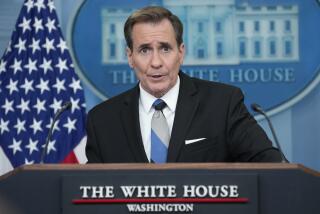U.S. Trims Verification Plan for Missile Treaty
- Share via
WASHINGTON — The United States scaled back its verification plan for a proposed treaty banning intermediate-range nuclear missiles Tuesday, a step that officials said would prevent cheating without giving the Soviets an opening for espionage.
The new plan, handed to Soviet negotiators at the arms control talks in Geneva, sharply reduces the U.S. demand for on-site inspections of facilities in the United States, the Soviet Union and Western Europe.
State Department spokeswoman Phyllis Oakley rejected an interpretation by the Washington Post, carried by The Times in Tuesday’s editions, that the new U.S. plan represents a softening of earlier proposals. Other U.S. officials said that the revision eliminates provisions that Moscow could have used to enable spying on Western facilities unrelated to arms control.
U.S. officials say that verification has been one of the major obstacles to a treaty banning intermediate-range nuclear missiles. However, it is unclear whether the new U.S. proposal will bring the negotiations any closer to completion because Moscow has not yet reacted to the new plan.
Oakley and Terry Shroeder, spokesman for the U.S. delegation in Geneva, said that the changes were made possible by Soviet leader Mikhail S. Gorbachev’s acceptance last month of a U.S. proposal to eliminate all medium- and short-range missiles instead of allowing each side to keep 100 warheads, as Gorbachev and President Reagan agreed last October at their summit in Iceland.
Easier to Police
They added that it will be much simpler to verify total elimination of the weapons than it would have been to police a reduction to 100 warheads on each side.
Oakley said that the new U.S. proposal would allow each side to make surprise on-site inspections of facilities where illegal activity is suspected. But she said the revision permits far fewer inspections than the earlier plan would have allowed, because “the opportunities for illegal missile activities are significantly reduced when an entire class of missiles and its infrastructure has been eliminated.”
She said that the revised plan drops entirely an earlier proposal to allow each side to station inspectors at intermediate-range missile plants within the other’s borders to monitor the flow of weapons from factory to deployment to enforce the 100-warhead limit. With a global ban on the weapons, she said, such inspections would not be necessary because the factory itself would have to be dismantled.
“We have said all along that, in the context of global double zero (elimination of both medium- and shorter-range missiles), verification could be simplified,” Shroeder said in Geneva. “It is easier to detect cheating if there are no missiles around, obviously.”
“The United States has not softened or backed off its verification inspection measures,” Oakley said. “The regime we seek will have the most stringent verification of any arms control agreement in history.”
Oakley said that the United States will continue to insist on factory inspections of long-range missile facilities in separate talks covering the reduction of such strategic weapons.
For years, the United States has insisted on tough verification measures for arms control treaties to prevent Soviet cheating. Before Gorbachev’s rise to power, Moscow consistently rejected these proposals.
But Gorbachev has supported the idea of strict verification, an endorsement that apparently raised concern about Soviet espionage among some U.S. officials. In addition, European nations that had agreed to deploy U.S. intermediate-range missiles raised questions about inspections that would have been carried out on their territory.
Prevent Espionage
Defense Secretary Caspar W. Weinberger said that a treaty must be verifiable but should not give the Soviets an excuse for espionage.
“The verification problem is a very real one, and we do have to be certain that the Soviets do not try to use a verification provision to acquire a great deal more of our technology and the things we don’t want them to know about, not connected in any way with arms agreements,” Weinberger said in an interview Tuesday.
Although many details remain to be negotiated, both nations have expressed optimism that a treaty will be ready to sign later this year. Negotiations on strategic, or long-range, missile reduction are much further away from agreement.
Times staff writer John Broder contributed to this article.
More to Read
Sign up for Essential California
The most important California stories and recommendations in your inbox every morning.
You may occasionally receive promotional content from the Los Angeles Times.










